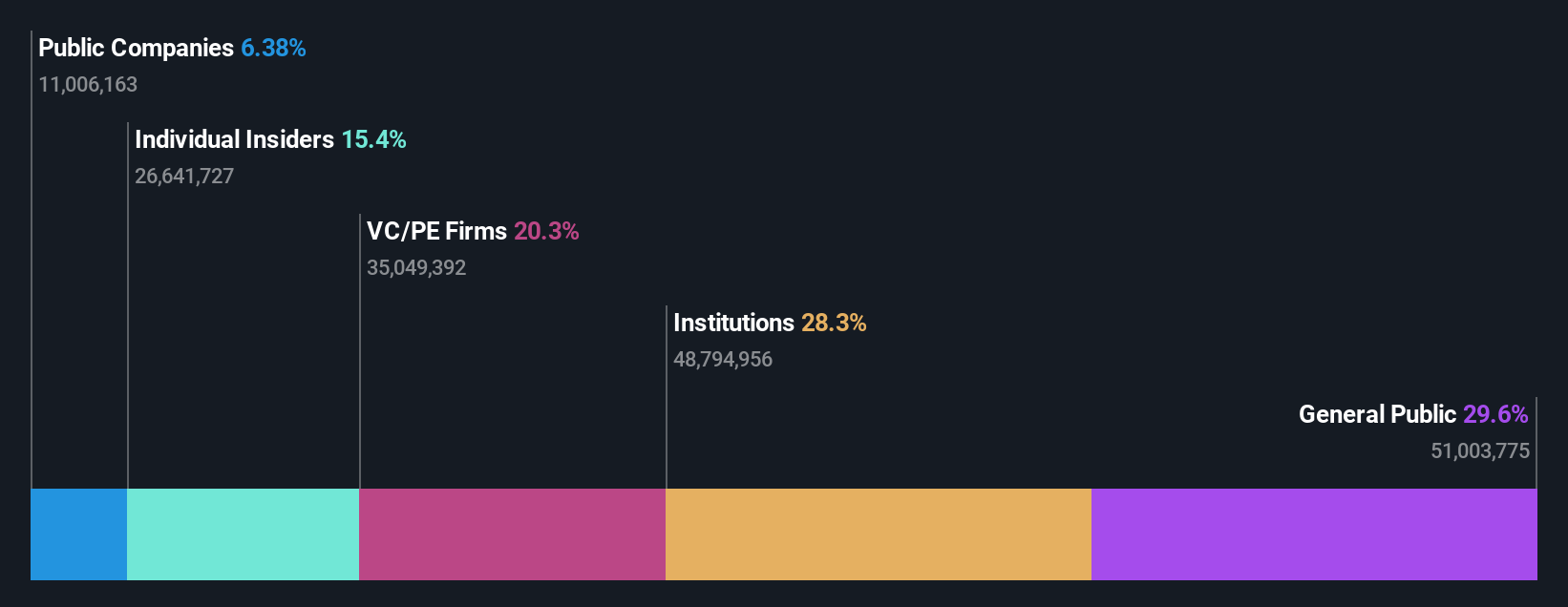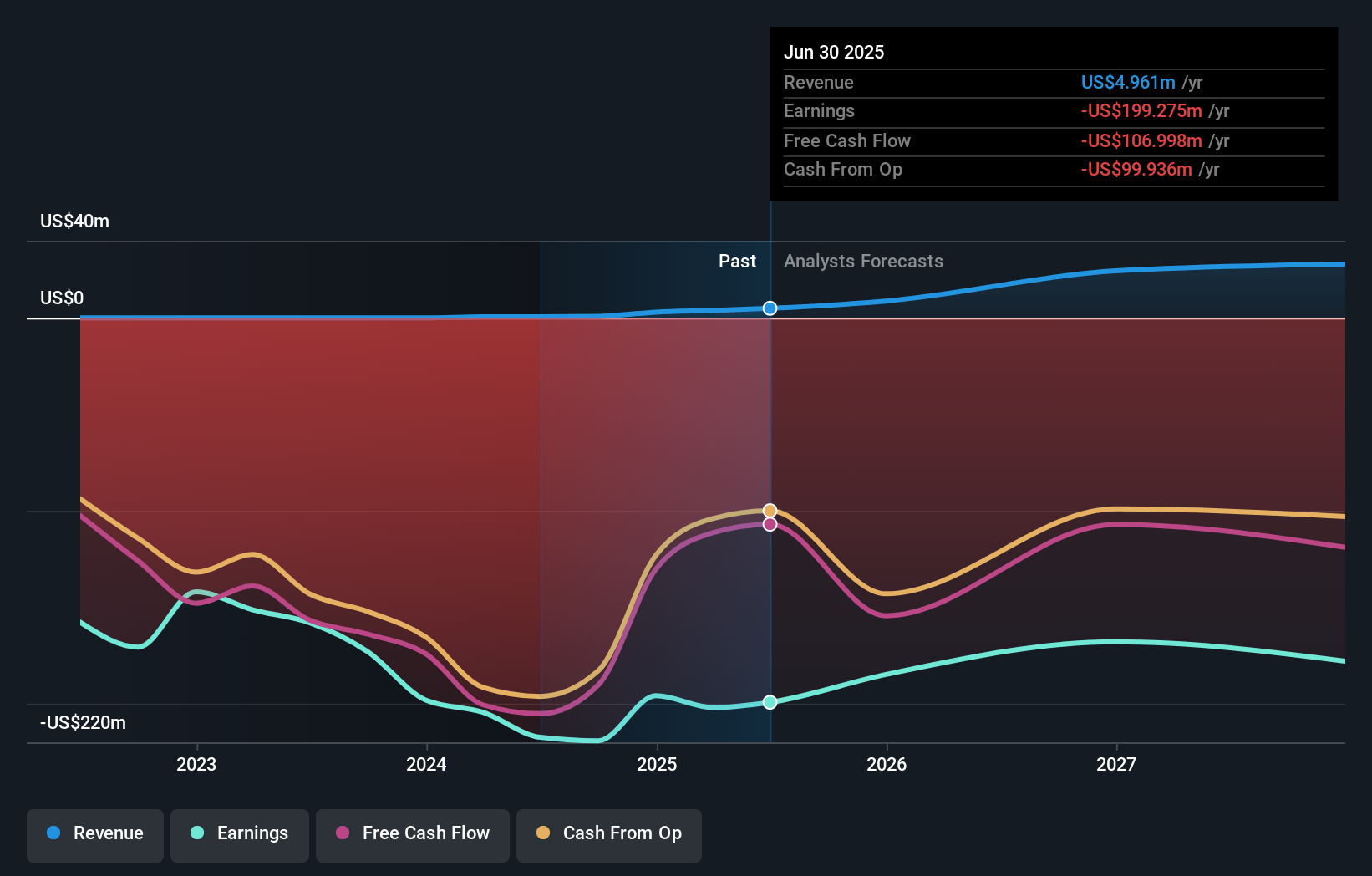- United States
- /
- Biotech
- /
- NasdaqGM:PRME
Prime Medicine, Inc.'s (NASDAQ:PRME) 6.6% loss last week hit both individual investors who own 30% as well as institutions
Key Insights
- The considerable ownership by retail investors in Prime Medicine indicates that they collectively have a greater say in management and business strategy
- The top 8 shareholders own 51% of the company
- Insiders own 15% of Prime Medicine
To get a sense of who is truly in control of Prime Medicine, Inc. (NASDAQ:PRME), it is important to understand the ownership structure of the business. We can see that retail investors own the lion's share in the company with 30% ownership. Put another way, the group faces the maximum upside potential (or downside risk).
While the holdings of retail investors took a hit after last week’s 6.6% price drop, institutions with their 28% holdings also suffered.
Let's take a closer look to see what the different types of shareholders can tell us about Prime Medicine.
View our latest analysis for Prime Medicine

What Does The Institutional Ownership Tell Us About Prime Medicine?
Institutions typically measure themselves against a benchmark when reporting to their own investors, so they often become more enthusiastic about a stock once it's included in a major index. We would expect most companies to have some institutions on the register, especially if they are growing.
We can see that Prime Medicine does have institutional investors; and they hold a good portion of the company's stock. This can indicate that the company has a certain degree of credibility in the investment community. However, it is best to be wary of relying on the supposed validation that comes with institutional investors. They too, get it wrong sometimes. If multiple institutions change their view on a stock at the same time, you could see the share price drop fast. It's therefore worth looking at Prime Medicine's earnings history below. Of course, the future is what really matters.

We note that hedge funds don't have a meaningful investment in Prime Medicine. Because actions speak louder than words, we consider it a good sign when insiders own a significant stake in a company. In Prime Medicine's case, its Top Key Executive, David Liu, is the largest shareholder, holding 12% of shares outstanding. For context, the second largest shareholder holds about 11% of the shares outstanding, followed by an ownership of 9.6% by the third-largest shareholder.
We also observed that the top 8 shareholders account for more than half of the share register, with a few smaller shareholders to balance the interests of the larger ones to a certain extent.
Researching institutional ownership is a good way to gauge and filter a stock's expected performance. The same can be achieved by studying analyst sentiments. There are plenty of analysts covering the stock, so it might be worth seeing what they are forecasting, too.
Insider Ownership Of Prime Medicine
The definition of company insiders can be subjective and does vary between jurisdictions. Our data reflects individual insiders, capturing board members at the very least. Company management run the business, but the CEO will answer to the board, even if he or she is a member of it.
I generally consider insider ownership to be a good thing. However, on some occasions it makes it more difficult for other shareholders to hold the board accountable for decisions.
Our most recent data indicates that insiders own a reasonable proportion of Prime Medicine, Inc.. It has a market capitalization of just US$960m, and insiders have US$148m worth of shares in their own names. We would say this shows alignment with shareholders, but it is worth noting that the company is still quite small; some insiders may have founded the business. You can click here to see if those insiders have been buying or selling.
General Public Ownership
The general public-- including retail investors -- own 30% stake in the company, and hence can't easily be ignored. This size of ownership, while considerable, may not be enough to change company policy if the decision is not in sync with other large shareholders.
Private Equity Ownership
With an ownership of 20%, private equity firms are in a position to play a role in shaping corporate strategy with a focus on value creation. Sometimes we see private equity stick around for the long term, but generally speaking they have a shorter investment horizon and -- as the name suggests -- don't invest in public companies much. After some time they may look to sell and redeploy capital elsewhere.
Public Company Ownership
It appears to us that public companies own 6.4% of Prime Medicine. It's hard to say for sure but this suggests they have entwined business interests. This might be a strategic stake, so it's worth watching this space for changes in ownership.
Next Steps:
While it is well worth considering the different groups that own a company, there are other factors that are even more important. For instance, we've identified 4 warning signs for Prime Medicine (1 is a bit unpleasant) that you should be aware of.
But ultimately it is the future, not the past, that will determine how well the owners of this business will do. Therefore we think it advisable to take a look at this free report showing whether analysts are predicting a brighter future.
NB: Figures in this article are calculated using data from the last twelve months, which refer to the 12-month period ending on the last date of the month the financial statement is dated. This may not be consistent with full year annual report figures.
New: Manage All Your Stock Portfolios in One Place
We've created the ultimate portfolio companion for stock investors, and it's free.
• Connect an unlimited number of Portfolios and see your total in one currency
• Be alerted to new Warning Signs or Risks via email or mobile
• Track the Fair Value of your stocks
Have feedback on this article? Concerned about the content? Get in touch with us directly. Alternatively, email editorial-team (at) simplywallst.com.
This article by Simply Wall St is general in nature. We provide commentary based on historical data and analyst forecasts only using an unbiased methodology and our articles are not intended to be financial advice. It does not constitute a recommendation to buy or sell any stock, and does not take account of your objectives, or your financial situation. We aim to bring you long-term focused analysis driven by fundamental data. Note that our analysis may not factor in the latest price-sensitive company announcements or qualitative material. Simply Wall St has no position in any stocks mentioned.
About NasdaqGM:PRME
Prime Medicine
A biotechnology company, engages in delivering genetic therapies to address the spectrum of diseases by deploying gene editing technology in the United States.
Excellent balance sheet with slight risk.
Market Insights
Community Narratives




